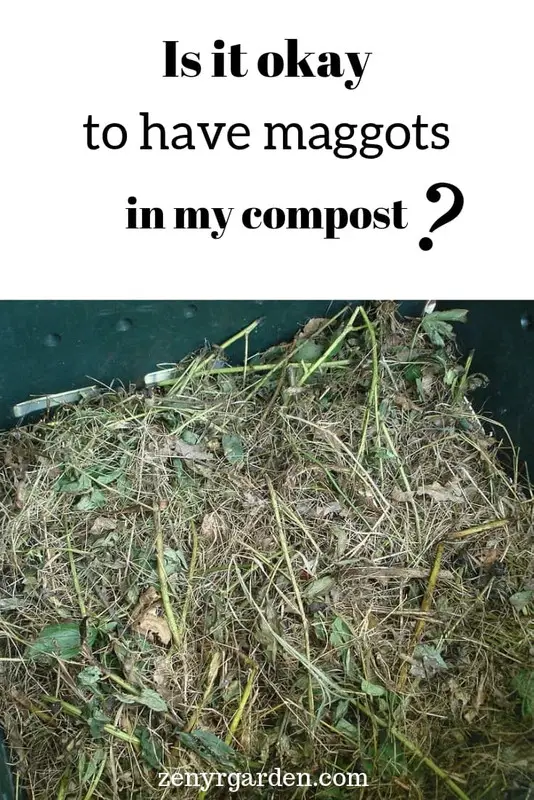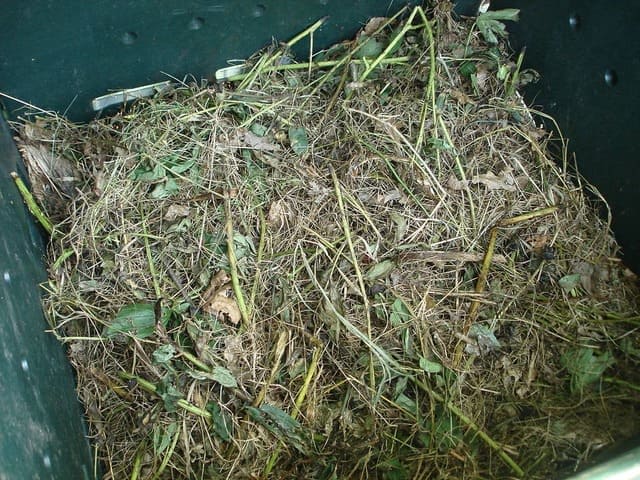Generally, having maggots in a compost would not be a totally big issue for the resulting quality of your compost. These little creatures are doing their part to help break down the organic matter.
But the reality is they do gross out a lot of gardeners! But don't worry, there are good ways to deal with them. Even some of these grubs are beneficial & can be yummy treats for chickens.
Let's see:
What to Do With the Maggots in Your Compost
#1. Wave Goodbye to the Maggots
If you're worried about a fly invasion problem, then sprinkle some garden lime powder in your compost. This will help control the larvae growth & slow them down. In a couple of days, you'll see much fewer maggots wiggling around.
Try adding more browns to the compost like cardboard pieces, brown leaves or sawdust to help with the aeration & moisture. Keep the moisture down so the flies won't be tempted to lay their eggs there.
The flies like a moisture content around 70% or more, so any level lower than that might help. But don't go too dry because it may slow down the composting process.
When you stop feeding the compost with greens like kitchen scraps, the maggot population will also naturally decrease.
In another case, if you don't want to kill the maggots, here are some ways to utilize them:
#2. Use Maggots As Fish Baits
These little larvae are some of the most nutritional & delicious treats for many animals. If you enjoy fishing, don't kill the maggots. Gather them & use them as baits. Fish love these!
Unlike some other insect baits like bee which stop moving when they're dipped in the water, when the larvae are submerged in water, they'll still be alive and wiggling for hours. This moving maggot bait is really an attraction point to lure the fish in and hopefully catch them.
#3. For Chicken Feed
Also, if you raise chickens, feed the larvae to your guys and girls. Although some chickens may go 'Erhh, I'm not sure about that' when we first feed them with red worms, for the bsf larvae they'll come running no question asked and without any hesitation.
Inside some grubs like the black soldier fly grubs, there's about 40-45% protein, plus calcium & phosphorous. This helps build the chick muscles, make beautiful smooth feathers & the best of all nourish healthy chickens.
#4. For Other Pets
Some people call the BSF maggots a million-pet feed. Because insects in nature are the natural food for animals. Hamsters, cats, reptiles, frogs, shrimps enjoy munching on these little guys. For cats or hamsters that get some of these treats, they'll develop some smooth beautiful fur. In the end, people can save money on feed & get a renewable food source.
It may help to understand a bit about:
Why Did Maggots Appear Initially?
Houseflies, for example, love an environment that is wet or has a slightly stinky, putrid smell. They also do well in the lack of oxygen. This may suggest that the environment in your compost may be a bit too wet. Because of the excess moisture, it traps the oxygen, making the air around oxygen-lacking.
The smelly smell may also stem from the decomposing of high-protein or high-nitrogen stuff like meat, fish, diary, or too much green (grass clippings, young tender leaves). It creates an anaerobic environment that attracts houseflies, which gives birth to maggots.
Quick Fixes
To fix this, throw in some cardboard or sawdust to absorb the moisture. Or let the fluid drain out of the drainage holes. You may also reduce the amount of fresh greens. Because those tend to hold & release quite a bit of moisture in the pile.
Leave out the milk, cheese or meat, especially if you're living in an apartment or condo, because these can stink really bad. Turning your compost once a week or every other week can also help with air circulation & get the compost done faster. A good terracotta pot can also help with getting oxygen in and out.
To Keep or To Kill the Maggots
After all, nature's answer to this maggot problem in a compost may be "It's okay, it's alright. They won't do much harm after all". But many ladies & little kids would not really agree with this.
If maggots gross you out, add some garden lime powder or cardboard pieces to the compost to keep their population down. If you're cool about this, then utilize them as fish baits or chicken feed.
Gross as they may appear, these little creatures are extremely rich sources of protein & fats to keep your pets feeling happy and looking sharp. Hope this post has given you some ideas & see you again next time.
To find out more about maggots/larvae, you could check out the following post:
We also have a Black Soldier Fly larvae series here if you want a look at it later. Unlike houseflies, black soldier flies are beneficial non-pests useful for many purposes in the garden:
Share or pin this post!


